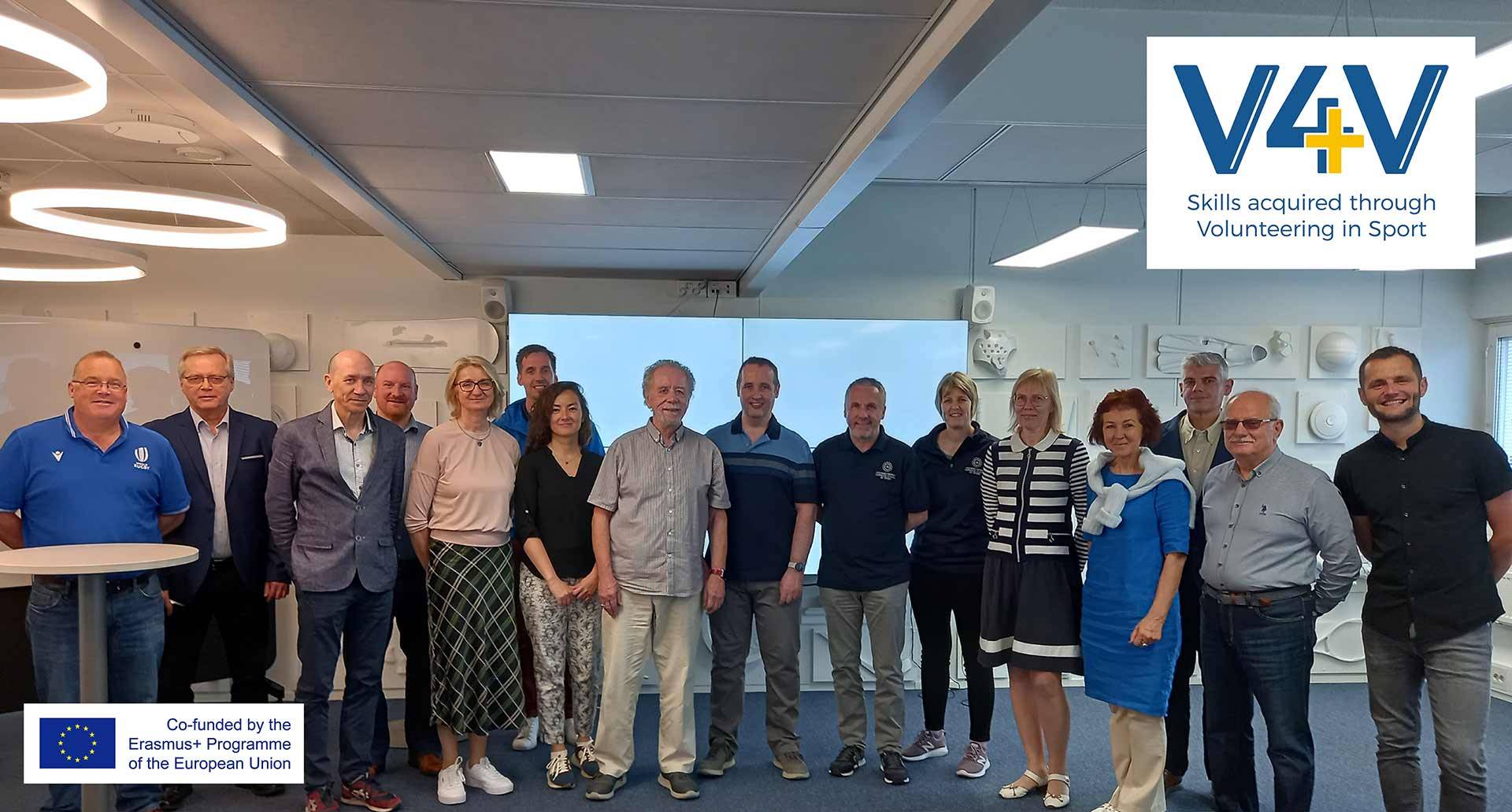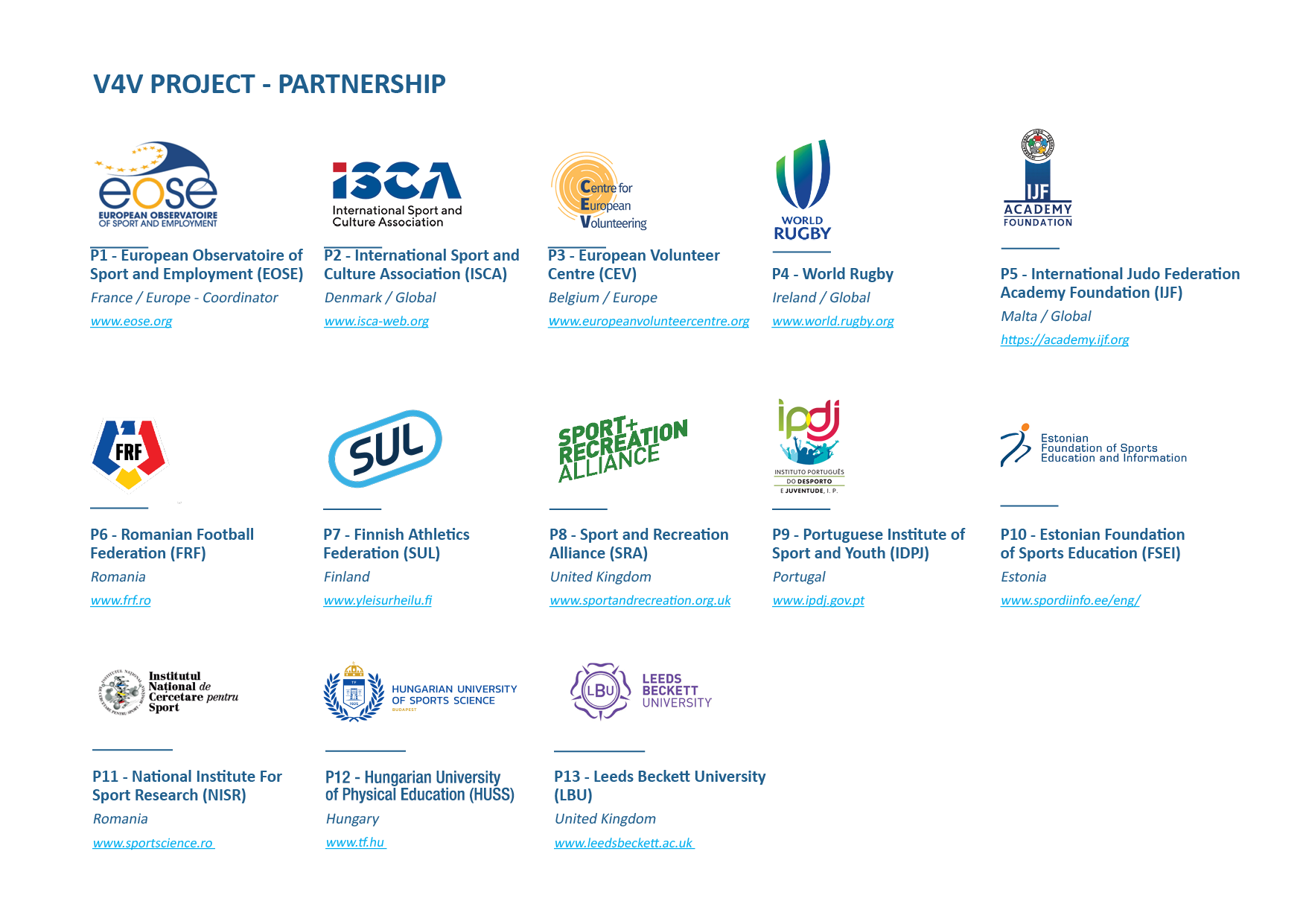A solid foundation of research to understand the realities and challenges in sport volunteering will inform new toolkits for sport organisations and volunteers. The 20th and 21st of June 2022 saw the partners in the V4V project gather in Helsinki, Finland, for the 3rd partner meeting and the first to take place face to face.

Dr. Szilvia Perényi, Associate Professor at the Department of Sport Management, said that in the research work so far, more than a thousand pages of research material was collected using document analysis and interview methods. The data collected has been summarised in two research reports under the leadership of Hungarain University of Spotrts Science in partnership with European Observatory of Spports and Employment (EOSE). The results of the reports were summarised in a presentation at the partners' meeting.
A key activity of the V4V project, the European Skills Survey on Sport Volunteering was based on and develeped from these two reports, which survey had been open for six weeks before the meeting. The partners were excited to learn about the first findings from the survey and discuss how the results can inform the V4V Mapping Report of the Sport Volunteer Workforce in Europe and two new sport volunteering toolkits.
The survey has now closed with a total of over 2700 responses from sport organisations in Europe and beyond.
By the date of the meeting just over 2000 responses had been received from sport organisations across Europe, with over 80% coming from sports clubs or federations. Over 37% of respondent organisations have no paid staff showing the survey successfully reached grassroots sport.
36% of respondents stated their number of volunteers had decreased during the period of the Covid-19 pandemic, showing there is a need to attract people back to sport volunteering.
Other key findings of the survey so far confirmed that:
- Volunteers provide sport organisations with energy and enthusiasm
- Volunteers need to feel valued and part of a team
- There are issues of not enough people interested in volunteering roles and low number of applicants
- Lack of time and lack of recognition are key barriers to sport volunteering
The survey also confirmed the need for sport organisations to get support with recruitment, management, retention, and training of volunteers – a key objective of the V4V project.
Following a final push to achieve the maximum response rate, the partners look forward to using the survey results, along with results of interviews with volunteers and desk research, to produce a report of new knowledge for the sector on sport volunteering in Europe.
A large part of the meeting in Helsinki was devoted to discussion of an innovative toolkit to facilitate engagement, development and retention of volunteers in sport organisations in Europe. This key output of the V4V project is being led by Leeds Beckett University and will be based on the survey results, desk research, and the expertise of all partners. At the meeting partners discussed the purpose, audience, format and contact of the new toolkit.
A further output of the project is to create a Competency Based Self-Assessment Tool to identify and showcase prior learning, transversal skills and attributes gained through sport volunteering. This was also discussed with valuable contributions from partners helping to shape this new tool.
The partners were very thankful to be able to meet in person after a year of working online in 2021 due to the Covid-19 pandemic, all agreed online formats cannot replicate the interaction and exchange of a face-to-face meeting.
The meeting was ably hosted by the Finnish Athletics Federation who made sure everything ran smoothly and arranged a nice dinner for the partners.
Jock Peggie, Head of Education, Laws and Compliance at World Rugby said: “It was great to be involved in the two-day workshop facilitated by our colleagues at EOSE as we progressed work in the important V4V project. Volunteers are a crucial part of our game, they are the people who will coach, officiate, and care for our current and next generation of players, they run the clubs, schools and rugby organisations that provide the opportunities for play and are the lifeblood of our game. The outcomes of this project will provide tools that all our member unions (not just our European ones) will be able to use to help recruit, retain and re-train volunteers in the present and the future, helping us to grow our game and continue to make it better and safer.”
Despite the fact that the first phase of the workpackage assigned to our university's researchers, Dr. Szilvia Perényi, research leader, and Dr. Judit Farkas, quality assurance expert, have completed, they will continue their expert activities in the further implementation of the project. The next step will be to organise a workshop on volunteering for sports organisations later this autumn.




